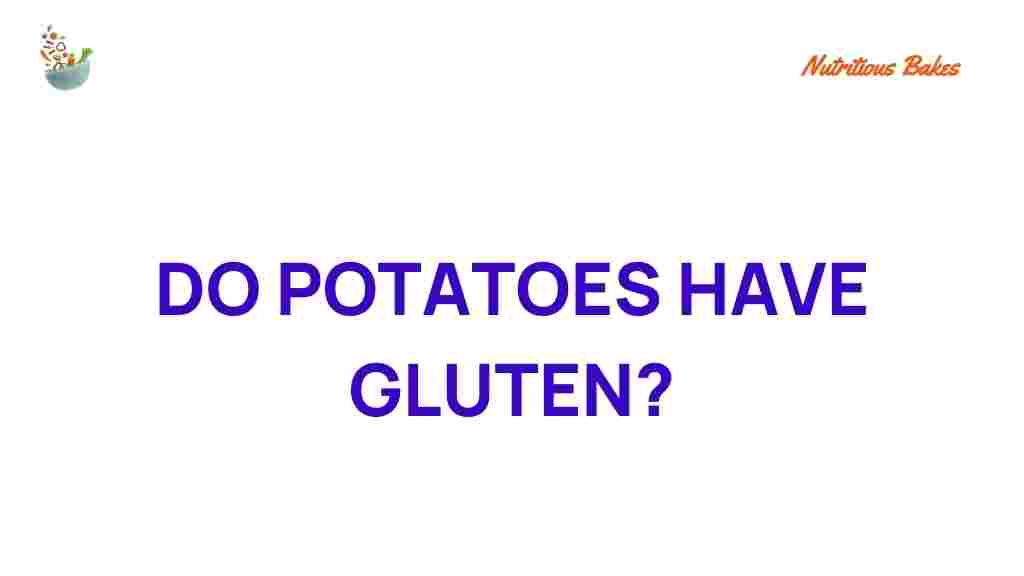Are Potatoes Gluten-Free? Discover the Truth Behind This Staple
Potatoes are one of the most widely consumed vegetables around the globe. They are versatile, nutritious, and can be prepared in countless ways. However, for individuals following a gluten-free diet, a common question arises: Are potatoes gluten-free? In this article, we’ll explore the nutritional profile of potatoes, clarify misconceptions about gluten, and provide insights into cooking and incorporating potatoes into a gluten-free diet.
Understanding Gluten and Its Impact on Health
Gluten is a protein found in various grains, including wheat, barley, and rye. For most people, gluten is harmless. However, for those with celiac disease or gluten sensitivity, consuming gluten can lead to severe health issues. Symptoms may include:
- Bloating and gas
- Diarrhea
- Fatigue
- Headaches
- Joint pain
It’s crucial for individuals with these conditions to avoid gluten entirely. Understanding which foods contain gluten and which do not is essential for maintaining health and well-being.
Are Potatoes Naturally Gluten-Free?
The simple answer is yes, potatoes are naturally gluten-free. Whether you prefer them boiled, baked, or mashed, potatoes themselves do not contain gluten. This makes them an excellent choice for those who need to avoid gluten-containing ingredients.
However, it’s important to consider how potatoes are prepared. While the potatoes themselves are gluten-free, certain cooking methods or added ingredients may introduce gluten into your meal. Here are some factors to consider:
- Cross-Contamination: If potatoes are cooked in oil used for frying breaded foods, they may become contaminated with gluten.
- Added Ingredients: Many potato products, such as frozen fries or potato chips, may contain gluten as a result of seasoning or processing.
Nutrition Benefits of Potatoes
Potatoes are not just gluten-free; they are also packed with essential nutrients. Here are some nutritional benefits of including potatoes in your diet:
- Rich in Vitamins: Potatoes are a good source of Vitamin C and Vitamin B6, which are vital for immune function and energy metabolism.
- High in Fiber: The skin of potatoes contains dietary fiber, which aids digestion and helps maintain a healthy gut.
- Low in Calories: When prepared without excessive fats or oils, potatoes are relatively low in calories, making them a healthy carbohydrate choice.
- Minerals: Potatoes are a good source of potassium, which is important for heart health and regulating blood pressure.
Incorporating potatoes into a balanced diet can contribute to overall health and well-being.
Common Misconceptions About Potatoes and Gluten
Despite their gluten-free status, several misconceptions exist regarding potatoes. Let’s address a few of these:
- All Potato Products Are Gluten-Free: As mentioned earlier, not all potato products are gluten-free. Always check labels for gluten-containing ingredients.
- Potatoes Are Unhealthy: Some people view potatoes as unhealthy due to their carbohydrate content. However, when prepared healthily, they can be a nutritious part of your diet.
- Sweet Potatoes Are Healthier Than Regular Potatoes: Both regular and sweet potatoes offer unique nutritional benefits and can fit well into a gluten-free diet.
Cooking Potatoes for a Gluten-Free Diet
Cooking potatoes can be simple and delicious. Here are some popular methods to prepare gluten-free potato dishes:
Boiling
Boiling potatoes is one of the simplest methods. Here’s how to do it:
- Wash the potatoes thoroughly to remove dirt.
- Peel them if desired, though leaving the skin on retains nutrients.
- Cut the potatoes into equal-sized pieces for even cooking.
- Place them in a pot of salted water and bring to a boil.
- Cook for 15-20 minutes or until tender.
Baking
Baked potatoes are a classic dish. Here’s a quick recipe:
- Preheat your oven to 425°F (220°C).
- Scrub the potatoes and poke holes with a fork.
- Rub with olive oil and sprinkle with salt.
- Bake for 45-60 minutes until the skin is crisp.
Mashing
Mashed potatoes are a comfort food favorite. To make them:
- Boil potatoes until tender as described above.
- Drain and return to the pot.
- Add butter, milk, salt, and pepper to taste.
- Mash until smooth and creamy.
Incorporating Potatoes into a Gluten-Free Diet
Potatoes can be a versatile ingredient in a gluten-free diet. Here are some ideas for meals and snacks:
- Potato Salad: Combine boiled potatoes with gluten-free mayonnaise, mustard, and diced vegetables for a refreshing salad.
- Potato Soup: Make a creamy potato soup using gluten-free broth and seasonings.
- Stuffed Potatoes: Fill baked potatoes with cheese, broccoli, or chili for a hearty meal.
- Potato Chips: Make homemade chips by slicing potatoes thinly, seasoning, and baking until crispy.
Troubleshooting Common Issues When Cooking Potatoes
While cooking potatoes is generally straightforward, you may encounter some issues. Here are some troubleshooting tips:
- Potatoes Are Mushy: If your mashed potatoes are too runny, add a bit of cornstarch or more potatoes to thicken them.
- Skin Is Too Tough: If the skin of baked potatoes isn’t crispy, try increasing the baking time or temperature slightly.
- Uneven Cooking: To ensure even cooking, cut potatoes into uniform pieces before boiling or roasting.
Conclusion
In summary, potatoes are a naturally gluten-free food that can be a nutritious addition to your diet. Understanding their nutritional benefits, how to prepare them, and addressing common misconceptions can help you incorporate potatoes into your meals confidently. Whether you’re boiling, baking, or mashing, potatoes offer endless possibilities for delicious gluten-free dishes.
For more information on gluten and health, check out this external resource. If you’re looking for gluten-free recipes, visit our recipe page for inspiration!
Remember, when in doubt about the ingredients or cooking methods, always read labels and ask questions to ensure your meals remain gluten-free. Enjoy your potato dishes!
This article is in the category Ingredients and created by NutritiousBakes Team
